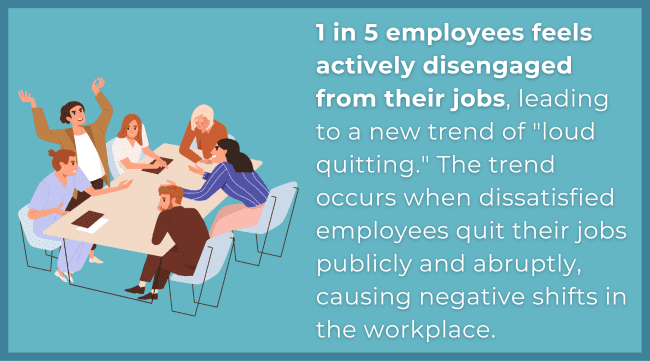
A new trend, “loud quitting,” has emerged where employees dissatisfied with their jobs or work environment decide to resign abruptly and publicly. Nearly 1 in 5 employees are actively “disengaged” from their jobs, which creates a culture of unhappy employees. When these feelings go on for too long, employees become resentful that their needs are not being met and act out. This can lead to negative behavior harming the employee and the company. These behaviors include spreading negativity to other workers, decreased productivity, increased conflicts, and a toxic work environment. Employers need to be able to recognize the signs of loud quitting and have the necessary tools to address this disruptive trend.
Common signs to look for:
- Negative attitude and dissatisfaction while at work. When employees contemplate quitting their job abruptly and loudly, they may begin by making negative comments about their employer, coworkers, and work environment. These comments often concern excessive workload, unfair treatment, and lack of recognition.
- Increased conflicts with other employees. Employees may engage in arguments, refuse to collaborate, or create a hostile work environment when about to quit loudly. These conflicts can be heightened when conflicting with superiors and managers due to a build-up of frustration.
- Withdrawal from team activities. Employees dissatisfied with their jobs start to distance themselves from team meetings, social gatherings, and other collaborative activities with other employees at or outside of work.
- Decreased productivity and disinterest in work. Loud-quitting employees may show a significant drop in their productivity and engagement levels. The output and quality of their work may take a severe decline, such as missing deadlines, producing subpar work, and an unwillingness to do small tasks.
- Frequent Absences and Tardiness. Loud quitting may follow increased absences and an employee being late to work regularly. This demonstrates a lack of commitment and interest in their job and a disregard for company policies.
Tools to prevent loud quitting:
- Improve communication. Creating an environment where your employees feel comfortable communicating with you is important. Encourage feedback and listen to their concerns without judgment. This open-minded approach can help identify the root cause of any issues and address discontent in the workplace. Providing a safe space for employees to have meaningful conversations with you is essential.
- Build strong relationships with employees. Fostering trusting relationships with your employees is essential to show that you are genuinely interested in their professional growth. Offering them opportunities for skill enhancement and seeking their opinion on significant decisions will make them feel valued and engaged.
- Foster a positive work environment. A leader should establish a supportive and inclusive workplace culture where employees feel appreciated and respected. Employees who feel supported and genuinely happy at work are less likely to quit.
- Address issues promptly. When unhappy employees voice their complaints or concerns, a leader should be able to recognize and respond to them promptly and effectively. Taking employee feedback seriously and quickly resolving issues will make employees feel valued, and their complaints are less likely to escalate into loud quitting behavior.
- Recognize and reward employees. Recognize and appreciate the efforts and achievements of employees, making them feel appreciated and valued in the organization. Ensure that their salary and benefits are comparable with those of other companies and that they are fairly compensated. When employees feel that their hard work is being rewarded and that they are being fairly compensated, they are less likely to become resentful and leave the company.

When employees loudly quit or show signs of dissatisfaction, it clearly indicates that there are issues in the company that require immediate attention. Managers should take action promptly to address these concerns. It’s crucial for employers to approach these situations with empathy and openness to create a supportive work environment where employees feel valued and respected. This can significantly reduce the risk of loud quitting and improve employee productivity and retention rates.
Looking for more ways for your organization can succeed? Subscribe to The JOHNLEONARD Blog!
